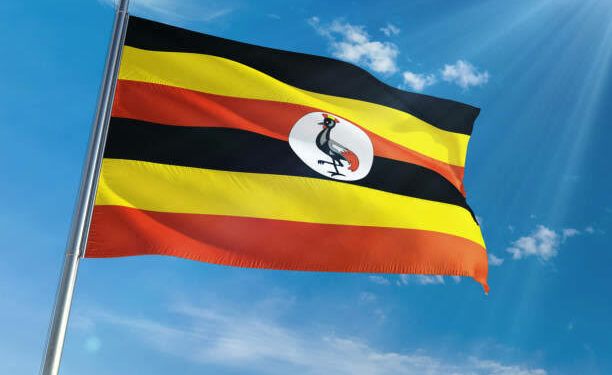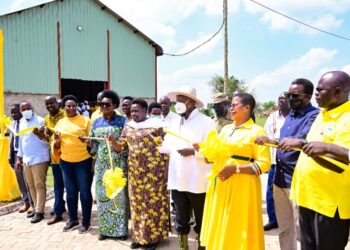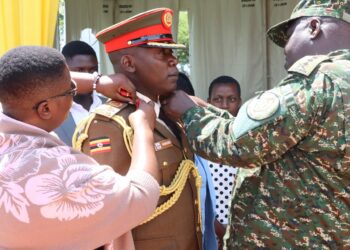As Uganda celebrates 62 years of independence, there are many fascinating stories about the symbols that shaped the nation. One such story involves the creation of the national anthem, a symbol of pride and unity.
However, few are aware that the original draft of the anthem’s first phrase was once rejected by the Church of Uganda for not mentioning God.
According to the original letters from Professor of History, African and Afro-American Studies at the University of Michigan Prof; Derek Petersen, Bishop Erica Sabiti of the Church of Uganda took issue with the original version of the national anthem because it lacked any mention of God.
In his letter to Apollo Milton Obote, Arch Bishop Sabiti reminded him that it was God who had helped them to deliver Uganda so his name must appear in the first phrase of the National Anthem.
This led to a revision, ensuring that the anthem aligned with the spiritual values held dear by many Ugandans, and ultimately, the anthem was accepted and became a beloved part of the nation’s identity.
Here’s the original version of the anthem by George Kakoma. The 1st phrase was ‘Oh Uganda, thy people praise thee’. However week before independence, the Church of Uganda bishop protested that God was nowhere mentioned.
Bishop Sabiti wanted it to sound like ‘Oh our God, thy people praise thee’.
Here is the original letter he sent to Apollo Milton Obote;
The Right Honourable the Prime Minister of Uganda,
The Prime Minister’s Office, Entebbe.
My dear Prime Minister,
I was much impressed by the new Coat of Arms which has been approved by your Cabinet, and I congratulate you especially on the choice of Motto, “For God and My Country”.
I am, however, disappointed that throughout the National Anthem, there is no mention of the word “God”. I feel that Uganda is a religious country and it is a pity that the word “God” is not named in her Anthem.
I would venture to suggest that in the first Verse, instead of “Oh, Uganda thy people praise thee etc.”, it would be appropriate to sing “Oh, our God, Thy people praise Thee etc.” Then the second and third verses could remain as they are. This would show that we put God first in our loyalty to our country.
When you were at the London Conference, the acting Prime Minister called on all the religious leaders to pray for God’s guidance; in fact, he said that we should pray that God might give you the Wisdom of Solomon. We did so pray and at the conclusion of your very successful Conference we were asked to give thanks to God, the achievements being attributed to the prayers of the people.
I have no doubt that many people felt that the government depended upon God in its deliberations. I should like to say that as we emerge to Independence, it is our prayer that we should all the time be depending upon God.
Yours sincerely,
Copy to the Host Reverend the Archbishop of Uganda, the Most Reverend the Archbishop of Rubaga,
While writing him back, Obote also suggested his version which sounded like this; God lead Uganda whose people praise thee, Uganda we lay our future in thy hands United free for liberty Together we’ll always stand.
Here is the original letter Obote sent to Bishop Sabiti;
TELEPHONE NO THAPALDA 2001.
Your pace the Bishop,
I thank you for your letter of 1st September which has been forwarded to me in London. I am very sympathetic with the unanimous request of the Council of Namirembe that the first line of the National Anthem should be amended by substituting (God), for (Uganda).
This request came to me before I left Uganda, from other sources and I had occasion to examine it with some of my colleagues and members of the general public. I should like to inform you that I personally have no objection to the amendment proposed and my colleagues in the Cabinet do share that view, but some of the people I have consulted, though not expressing definite opposition, have views which are rather strong against it.
Their view is that the change would make the first verse of the National Anthem a hymn and not an Anthem and that Uganda as a country would not come into the picture at all until the second verse.
There is, of course, no doubt that Christianity had a strong influence in shaping the destiny of Uganda and will certainly continue to do so in future. While I believe all this absolutely and know that your feelings are very much the same, I do also trust that you will see my difficulty in finding suitable words which would satisfy the whole country.
It is clear that the words already published would not satisfy those Christians whose views have been expressed by members of the Council of Namirembe Diocese to change the words as requested by the Council. We do not wish to be difficult, but we have to guard against the views of other persons about whom I have already made reference. I hope that you will agree that this is not a move to have an unchristian National Anthem and that this is a case in which one cannot decide upon by counting the number of people who hold different views.
I have given much thought to this matter and my conclusion in that neither view is satisfactory but acceptable. I am therefore requesting the Acting Prime Minister by a copy of this letter to arrange for the first verse of the National Anthem to have the following words or meaning.
“God lead Uganda whose people praise thee, Uganda we lay our future in thy hands, United free, For liberty, Together we always stand.”
Arch The Bishop of Namirembe.
Yours Sincany, Amilton Obote
However when his version reached his cabinet ministers who had a better sense of rhythm than him) soon realised that his revised text would not work with the tune’s structure. Moreover, 85,000 copies of the Kakoma/Wingard version had been printed.
And they had to write again to the Archbishop telling him how his words would not fit in the flow of the anthem; here is the original letter
Telephone Entebbe 441.
20945/3
My Dear The Archbishop,
Will you please refer to the Prime Minister’s letter of 13th September, sent to you from London, on the subject of the Uganda National Anthem? Immediately on seeing a copy of that letter, I considered, with my Ministerial colleagues and the officials concerned, the implications of changing the wording of the National Anthem at this late stage.
I am afraid that there are very considerable practical difficulties. First, the revised words cannot easily be fitted to the existing music as it would involve adding three extra syllables in the second line. I am advised that to add these syllables would result in a “hurried” effect which would destroy the dignity of the Anthem.
Secondly, some 85,000 copies of the Anthem in various forms have already been printed and it would be quite impossible to re-print all these copies at this late stage; also, with the tremendous amount of printing still to be done, it is impracticable to print so many amendment slips and insert them in each copy of the programme, copies of the words and music for schools, etc., etc.
I have therefore decided that I must refer this matter back to the Prime Minister in London and point out the practical difficulties of implementing his decision. I am telegraphing him accordingly today.
In the meantime, I shall be grateful if you would keep the contents of the Prime Minister’s letter of 13th September to yourself and not, for the present, let it be known amongst members of your Church that the words are definitely to be changed.
I will write to you again as soon as I have heard from the Prime Minister.
Yours sincerely,
(G.B.K. Magezi) Acting Prime Minister
The Archbishop of Uganda,
P.O. Box 56,
Kampala.
………………………………………..
According to GBK’s letter changes would not be possible however Obote’s team sat and they came up with the present version Ugandans sing today. However on the independence day of 9 October 1962 Ugandans sang the original text: ‘Oh Uganda! Thy people praise thee’.
The anthem was revised in December 1962, and the first verse was changed to the words we now sing: ‘Oh Uganda! May God uphold thee…
Here is the letter Obote wrote to the Archbishop informing him of what his cabinet had decided.
Telephone: Entebbe 441,
20945/3
Your Grace,
We have been giving some consideration to the wording of the National Anthem. It was not possible before Independence, when we selected the music and the wording of the National Anthem, to effect any changes that most Christians wanted, which included an expression of “God”.
We have sought advice from experts in music and we have now decided that the first verse of the National Anthem shall be worded as follows:-
“Oh Uganda! may God uphold thee, We lay our future in thy hand. United, free, for liberty together we’ll always stand.”
His Grace the Lord Archbishop of Uganda,
P.0. Box 56,
KAMPALA.
The Church of Uganda insisted that the name of God be included in the opening lines of the national anthem, a request that was later fulfilled. The anthem’s entire wording was crafted by George William Kakoma and Peter G. Wingard, while the musical composition and scaling were solely done by G.W. Kakoma.
Do you have a story in your community or an opinion to share with us: Email us at editorial@watchdoguganda.com













